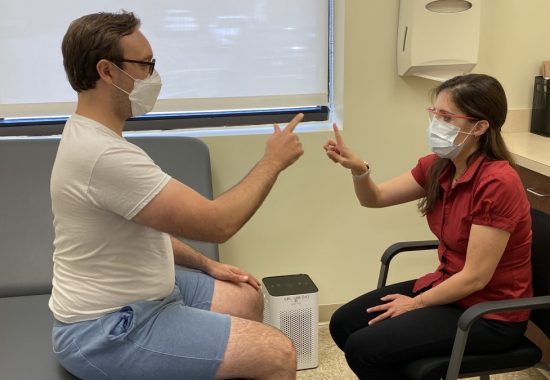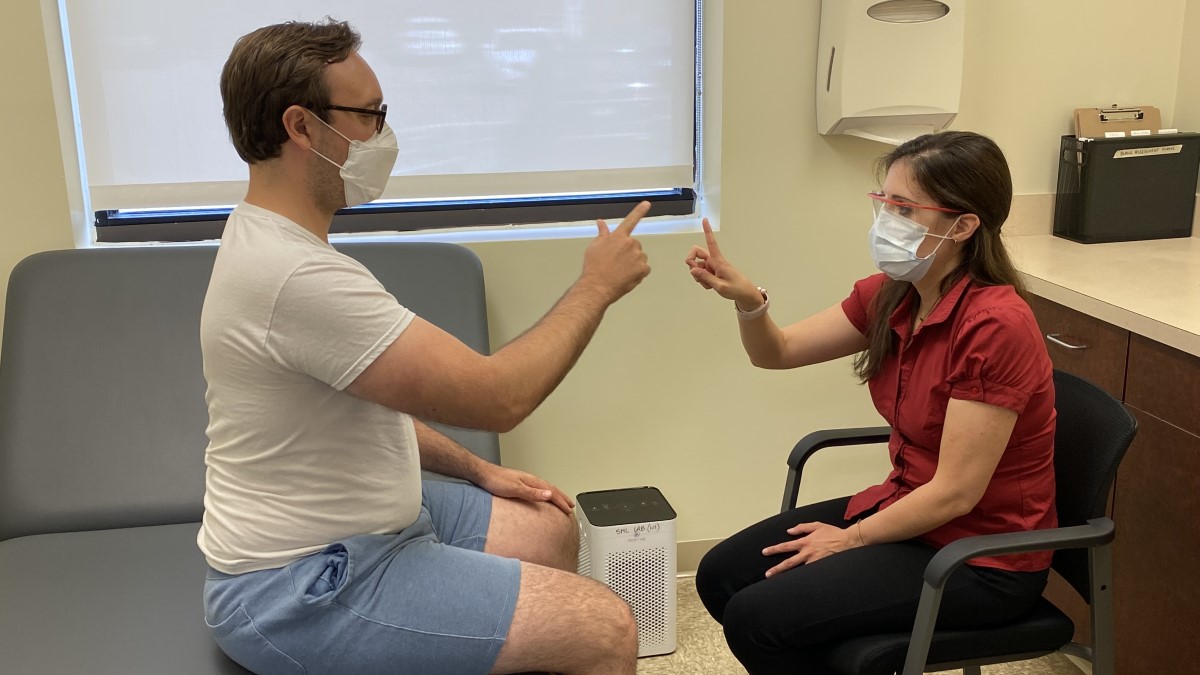Established in 2019, the Sensorimotor Learning Laboratory at Moss Rehabilitation Research Institute (MRRI) is directed by Amanda Therrien, PhD. Dr. Therrien’s research uses a combination of computational and behavioral methods to improve our understanding of the neural mechanisms that underlie movement control and learning. Dr. Therrien uses this knowledge to develop new movement training techniques aimed at improving rehabilitation for individuals who have suffered damage to different brain regions.
The primary focus of Dr. Therrien’s research is studying the effects of damage to a structure in the brain called the cerebellum, which plays a crucial role in the control of movement. When the cerebellum is damaged, the result is impaired movement coordination. Individuals with cerebellar damage have trouble controlling their balance when standing. They also have difficulty speaking, walking, coordinating reaching movements with their arms, and controlling movements of their eyes. The pattern of poorly coordinated movement that results from cerebellar damage is called Ataxia. It represents a disabling movement disorder that affects many people around the world.
Many neurological conditions can damage or disrupt the cerebellum and cause Ataxia – e.g., stroke, Multiple Sclerosis, Cerebral Palsy, and congenital malformations. However, a lot of Dr. Therrien’s work has studied a host of genetic conditions, called Spinocerebellar Ataxias (SCAs) that cause a progressive degeneration of the cerebellum. While SCAs run in families, other genetic conditions that cause cerebellar degeneration can occur without a family history as a result of sporadic genetic mutations.
Dr. Therrien’s research examines whether neural mechanisms that do not depend as heavily on the cerebellum, and are intact in Ataxia, can be leveraged to help individuals with this condition control and learn to adjust their movement. Dr. Therrien’s work also studies impairments in sensory processing that can occur with Ataxia. Impaired sensory processing in Ataxia has received little attention historically, but is likely a major contributor to the movement disorder.
September 25th is International Ataxia Awareness Day, a day where individuals and organizations, such as the National Ataxia Foundation in the United States, unite to increase public awareness and support for Ataxia. MRRI is excited to contribute to this effort! On October 16th, Dr. Therrien will be representing MRRI at this year’s National Ataxia Foundation Walk n’ Roll to Cure Ataxia. While this year’s National event will be held virtually, smaller, local, in-person Walk n’ Roll events will be held across the United States. Dr. Therrien will be participating in and fundraising for the Central PA Walk n’ Roll Event.
Dr. Therrien is not the only MRRI scientist with experience conducting research on Ataxia. Aaron Wong, PhD, Director of the Cognitive Motor Learning Laboratory and Scientific Director of the Klein Family Parkinson’s Rehabilitation Center at MossRehab, has also done important work investigating the role of the cerebellum in eye movement control and movement learning in people with Ataxia. To get involved or learn more about Ataxia research at MRRI, you can follow us on Twitter] and Facebook. You can also learn more about Dr. Therrien’s research and the Sensorimotor Learning Laboratory, as well as Dr. Wong’s research and the Cognitive Motor Learning Laboratory on our website.



4 comment on “The Sensorimotor Learning Laboratory Brings Expertise in Cerebellar Ataxia to MRRI”